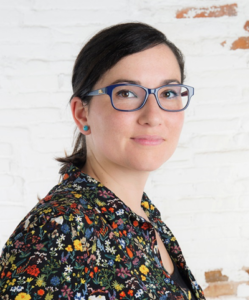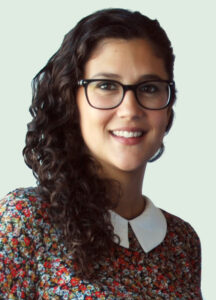The Institute for Bioengineering of Catalonia has two more researchers who receive a Beatriu de Pinós fellowship: Aurora Dols, researcher of the group “Nanoscale Bioelectrical Characterization” led by Gabriel Gomila and, Zaida Álvarez, researcher of the group “Biomaterials for regenerative therapies” led by Elisabeth Engel. These distinguished fellowships are awarded by the Catalan Government through the Agency for Management of University and Research Grants (AGAUR) and have the objective of promoting the incorporation of highly qualified research personnel with international experience to research centers in Catalonia.
Aurora Dols will carry out the project entitled “Correlative Electrical and Mechanical Scanning Probe Microscopy for Life Science Applications”, which aims to develop, in three years, a system to measure, locally, the mechanical and electrical activity in biological samples. As proof of concept, they will study the internalization process of the TAT (transactivator of transcription) peptide, derived from HIV and used in drug delivery systems.
I will return to the laboratory where I did the PhD thesis but with a quite different project that combines what I have learned over the years with the technological development that has been done by the group during this time.
Aurora Dols, laboratory “Nanoscale Bioelectrical Characterization”
On the other hand, Zaida Álvarez, currently associate professor and researcher at the Simpson Querrey Medicine Department and Institute (Northwestern University, Chicago), will carry out a research line at IBEC that is based on the construction of 3D-printed hybrid tissues for spinal cord injury repair. The project proposes to use components of the extracellular matrix of spinal cord cells, in both foetal and adult stages of development, in combination with the polylactic acid polymer, which has angiogenic properties (stimulates the formation of blood vessels). The objective is to achieve a tissue capable of promoting the growth of neuron axons (responsible for the transmission of electrical impulses between cells), of revascularizing the lesion and finally achieving functional recovery in vivo.
My goal is to explore the differential regenerative capacity of the foetal versus adult spinal cord extracellular matrix after spinal cord injury.
Zaida Álvarez, laboratory “Biomaterials for regenerative therapies”
The Beatriu de Pinós fellowship program promotes multidisciplinary collaborations between researchers, who also receive support and training from AGAUR. This call, financed by the Secretariat for Universities and Research of the Catalan Government, was endowed with 8.658.000 euros in total, and each fellowship will receive 144.300 euros for the professional financing of the selected researchers.
On this call, 60 researchers were awarded: 31 men and 29 women, among whom Zaida and Aurora. This call has stood out for the high percentage of fellowships awarded to women, who received 48% of the grants, when 40% of the 251 applications submitted were from women.







